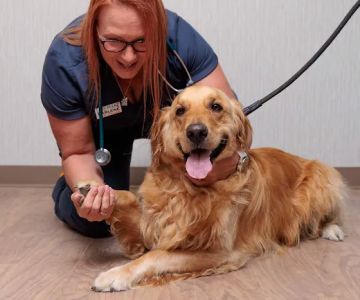How to Become a Veterinary Doctor: Steps to Take and What You Need to Know
Becoming a veterinary doctor is a rewarding and challenging career choice for those who have a passion for animals and want to make a difference in their lives. It requires dedication, years of education, and a deep understanding of animal health. If you’ve ever wondered how to become a veterinary doctor, this article will walk you through the necessary steps and the path you need to take to achieve this goal. I’ll also share some personal insights and stories from the journey of becoming a vet to provide a clearer picture of what to expect.

14309 Manchester Rd, Manchester, MO 63011, USA
See Details1. The Foundation: Love for Animals
Before we dive into the technicalities of how to become a veterinary doctor, let's start with the most important foundation: a love for animals. Most veterinarians have a deep-seated passion for animals, whether they grew up with pets or simply have a natural interest in animal welfare. This passion is crucial, as it will drive you through the rigorous education and emotional challenges that come with caring for animals.
But, passion alone isn't enough. It's essential to develop the necessary knowledge and skills to provide care for animals. This begins with obtaining a strong academic background, which starts in high school. If you’re still in school, it’s important to focus on subjects like biology, chemistry, and physics, as these will form the foundation of your future studies in veterinary medicine.
2. Education Requirements for Veterinary Medicine
To become a veterinary doctor, you need to complete several years of formal education. Here are the basic educational steps:
- Undergraduate Degree: The first step is to obtain a bachelor’s degree, usually in a related field like biology, animal science, or pre-veterinary medicine. This typically takes about 4 years. During this time, you should aim for a high GPA and gain practical experience through internships or volunteer work at animal shelters, farms, or veterinary clinics.
- Veterinary School: After completing your undergraduate degree, you must apply to a veterinary school. Veterinary schools are highly competitive, so it’s essential to have excellent academic credentials, relevant experience, and strong recommendations. Veterinary programs typically take 4 years to complete, and they involve rigorous coursework in subjects like animal anatomy, pathology, pharmacology, and surgical techniques.
- Licensing: Once you’ve completed veterinary school, you must pass the North American Veterinary Licensing Examination (NAVLE) to become licensed to practice as a veterinary doctor. Each state may have additional licensing requirements, so it's important to check with your local veterinary board.
3. Key Skills and Qualities for Success
Being a veterinary doctor requires more than just academic knowledge. To succeed in this field, there are several key skills and personal qualities that will help you excel:
- Communication Skills: As a vet, you’ll be interacting with pet owners, discussing treatment options, and explaining medical conditions. Clear communication is vital for building trust and ensuring the best care for animals.
- Problem-Solving Skills: Veterinary medicine often involves diagnosing and treating a wide range of health issues. Being able to think critically and make informed decisions is essential for providing the best care possible.
- Physical Stamina: Veterinary work can be physically demanding, especially if you are performing surgeries or caring for large animals. Physical endurance and the ability to manage long hours are important traits for a successful veterinary doctor.
- Empathy and Compassion: Caring for animals and their owners requires a great deal of empathy. Understanding the emotional impact on pet owners and providing comfort during difficult times is a crucial aspect of the job.
4. Specializing in Veterinary Medicine
After completing the basic veterinary education and becoming licensed, some veterinarians choose to specialize in specific areas of animal care. Specializing can involve additional training and certification, but it opens up exciting career opportunities. Specialties within veterinary medicine include:
- Emergency and Critical Care: Working in an emergency room, treating animals with urgent or life-threatening conditions.
- Small Animal Practice: Treating common household pets like dogs and cats.
- Large Animal Medicine: Working with livestock and farm animals, such as cows, pigs, and horses.
- Veterinary Surgery: Specializing in surgical procedures and treatments for animals.
- Veterinary Oncology: Focusing on the diagnosis and treatment of cancer in animals.
5. Real-Life Insights: The Journey of Becoming a Veterinarian
Becoming a veterinary doctor is not an easy journey, but it’s incredibly fulfilling. I remember my own journey—starting from a young age when I was fascinated by animals. I volunteered at animal shelters, worked part-time at a local veterinary clinic, and shadowed several veterinarians. These experiences solidified my decision to pursue veterinary medicine. When I entered veterinary school, I realized that it was much more challenging than I had imagined, but it was also incredibly rewarding.
One particular case that stands out is when I treated a dog with a severe fracture. The surgery was complicated, but I was able to successfully perform it and help the dog recover. The gratitude from the pet owner made all the hard work worth it. This experience taught me the importance of perseverance and the emotional rewards of this career.
6. Career Opportunities and Job Outlook
The job outlook for veterinarians is quite strong. According to the U.S. Bureau of Labor Statistics, the demand for veterinarians is expected to grow by 16% from 2019 to 2029, which is much faster than the average for all occupations. As more pet owners seek quality veterinary care, the need for skilled veterinarians continues to rise. Additionally, with the increasing focus on animal health in agriculture and research, opportunities for veterinarians are expanding across various sectors.
Conclusion and Next Steps
Becoming a veterinary doctor is a long but highly rewarding path. It requires hard work, dedication, and a deep love for animals. If you’re passionate about animals and ready for a challenging career, the veterinary field might be the perfect fit for you. To get started, focus on gaining a solid education, building relevant experience, and honing the necessary skills. As you continue along your journey, remember that each step brings you closer to making a real difference in the lives of animals and their owners.










